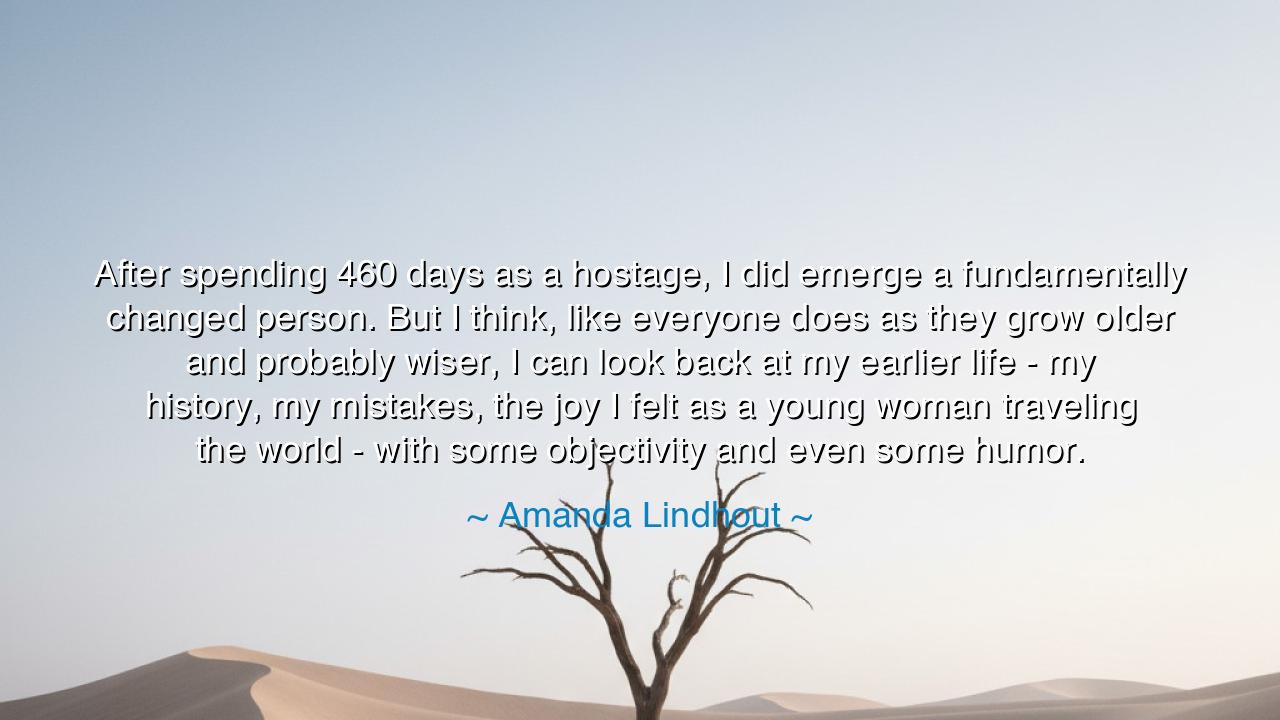
After spending 460 days as a hostage, I did emerge a
After spending 460 days as a hostage, I did emerge a fundamentally changed person. But I think, like everyone does as they grow older and probably wiser, I can look back at my earlier life - my history, my mistakes, the joy I felt as a young woman traveling the world - with some objectivity and even some humor.






The words of Amanda Lindhout carry the gravity of one who has walked through the valley of despair and returned bearing light. “After spending 460 days as a hostage, I did emerge a fundamentally changed person. But I think, like everyone does as they grow older and probably wiser, I can look back at my earlier life — my history, my mistakes, the joy I felt as a young woman traveling the world — with some objectivity and even some humor.” These are not the words of bitterness, but of transcendence. They speak of a soul who has endured the breaking of the body and the testing of the spirit, yet found within that crucible not hatred, but wisdom.
The ancients taught that suffering is the fire in which the soul is forged, and Lindhout’s story is a modern echo of that timeless truth. For 460 days, she was held captive in Somalia, torn away from the freedom that had once defined her. Yet from this darkness she emerged not hollow, but transformed. What she reveals in this quote is the quiet miracle of healing — the power to look back upon trauma not as an open wound, but as a teacher. Her words show that in time, pain loses its tyranny and becomes memory — something we can hold at arm’s length with objectivity, even smile upon with humor, because we have learned to survive it.
In her earlier life, Lindhout was a traveler — curious, fearless, hungry for the world. That young woman, innocent of the terrors to come, could not have imagined the test awaiting her. Yet even now, she speaks of her past self with compassion, not disdain. She remembers both mistakes and joy, seeing them as threads of the same tapestry. This is a wisdom few ever reach: the ability to look back without regret, to hold one’s former self gently, understanding that even the naïveté of youth is sacred, for it is what leads us to growth.
Consider the story of Viktor Frankl, the Austrian psychiatrist who survived the concentration camps of World War II. He too endured captivity and witnessed unspeakable cruelty. Yet afterward, he did not curse the world. He wrote, “When we are no longer able to change a situation, we are challenged to change ourselves.” Like Lindhout, he found meaning in the ashes of suffering. He emerged from his ordeal with a deeper compassion for humanity and an unshakable belief that man’s freedom lies not in circumstance, but in the attitude with which he confronts it. Both Frankl and Lindhout bear witness to a profound truth: that the soul can grow even in chains.
Lindhout’s mention of humor is not a denial of her pain, but a victory over it. To laugh at what once destroyed you is to reclaim your power. Humor, when born of deep suffering, is not frivolity — it is grace. It is the voice of the spirit saying, “You did not break me.” Many who have endured hardship understand this sacred laughter, for it is laughter that rises not from mockery, but from liberation. The ancients might have called it the laughter of the healed, the sound of a soul that has walked through the underworld and returned with understanding.
From this quote arises a profound lesson for all who suffer: time and reflection transform pain into wisdom. What seems unbearable today will one day be a story you can tell with clarity, even humor. But that transformation requires patience, compassion, and courage — the courage to face your own history without judgment. Do not run from your pain, but sit beside it as an old friend who has something to teach you. As you grow older, your wounds will not disappear, but they will lose their power to command your heart.
Therefore, dear listener, remember this truth: every life holds both captivity and freedom. You will be tested by fear, by loss, by the cruelty of others. Yet if you keep faith with yourself — if you nurture reflection, gratitude, and humor — you will find a way to rise from the wreckage, not as the person you once were, but as someone wiser, softer, and infinitely stronger. The objectivity Lindhout speaks of is not detachment, but peace — the peace that comes when you realize that no moment, however dark, is wasted, and that even suffering can become sacred when it teaches the heart to love the world again.
Thus, pass this wisdom to those who follow: endure, reflect, forgive, and laugh. For in doing so, you will not only survive your trials — you will transform them into light, as Amanda Lindhout has done, turning her captivity into a hymn of freedom for all who still search for hope in the dark.






AAdministratorAdministrator
Welcome, honored guests. Please leave a comment, we will respond soon